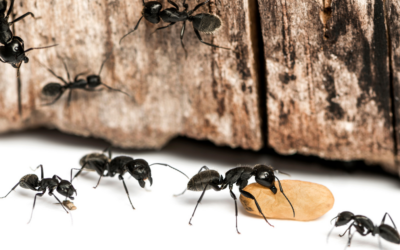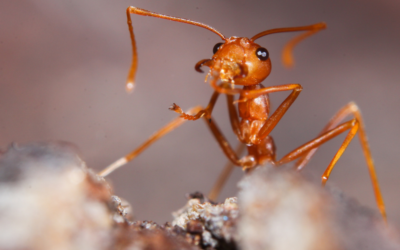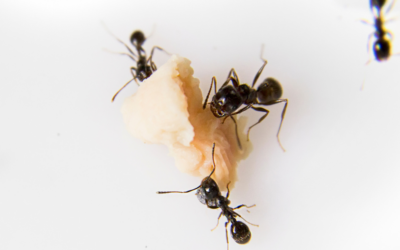Fire ants are some of the tiniest but mightiest insects on the planet. These bugs swarm in thousands and form mounds just like any other species of ant. Within these mounds lie entire colonies with very distinct caste systems. Generally, fire ants live similarly to any other kind of ant. So, what sets these critters apart from the rest of their teeny family?
The most important and distinct difference between fire ants and any other kind of ant is their stinger. The stinger is what holds the venom that elicits a “fire” type feeling when it is ejected into its victim. Other species of ants have stingers, but they do not use them as their defense mechanism. The rest of the ant family simply sprays formic acid upon their victim rather than stinging them. This difference might seem inconsequential, but this key difference is what makes a fire ant its own species.
How do they live?
As we discussed above, fire ants live in colonies just like any other type of ant. These colonies have distinct caste systems with a queen at the top of the hierarchy. The queen acts as the leader of the colony and is in charge of filling the colony. Below the queen is the winged form caste as well as the worker caste. The winged form cast is one of the smallest castes in the mound, with a life cycle of about a week. These ants are the ones that leave the mound to explore the surrounding area and consequently infiltrate homes.
The worker caste is the largest caste within the colony with a lifecycle of about 5 days. This caste performs a variety of jobs while carrying the main weight of the colony. These ants gather food, repair the colony, and take care of their queen. Ant colonies are organized, and complex, and offer a lot of understanding as to why or how ants infiltrate your property.
How did they get into my home?
Having ants infiltrate your house is incredibly common, especially if you have children or pets living in the home. There are many ways that ants can get into your home, but the real concern is why they have infiltrated your property. What attracted ants to your home, and how did they find their way in? Fire ants are attracted to your home because it meets their three main needs: food, water, and nesting sites.
Food
Fire ants are attracted to oily or greasy food. Leaving out food overnight or even for a couple of hours may seem minor. However, by leaving food out for extended periods of time, you leave your home vulnerable to ant invasion. The easiest way to control this issue is to be hyper-focused on putting leftovers in airtight containers and picking up food trash.
Water
Water may seem like something that ants could get anywhere, which is true. However, this point discusses ants’ attraction to standing water, not their need to consume water. If you have any stagnant water within the home, you are susceptible to an ant invasion. This includes flooding within your home, water leaks, and even lakes or ponds surrounding your home. These ants are attracted to moisture, and still, water offers the perfect amount of humidity for these ants to thrive.
Nesting Sites
Your home offers a myriad of nesting sites from the wood foundation to your humid attic. You may think that you have vigilant eyes, but ants can take over your home in the blink of an eye. These pests are so small that even a crack in the wall of your house can offer a home to hundreds of ants.
Now that we’ve discussed why ants have infiltrated your home, we need to discuss how to prevent them. One of the easiest solutions to your ant problem is hypervigilance and observancy in terms of the condition of your home. So, don’t leave food out, take the trash out, and take care of flooding as soon as you notice the problem. Now, we all forget to do certain things, and sometimes we just want a break, but by being observant you can save yourself a lot of trouble.
What is the best way to remove them?
So, what do you do if fire ants happen to infiltrate your home anyway? The first thing you can do is try a variety of home remedies. These remedies include boiling water and dish soap solutions; vinegar; peppermint oil; baking soda; and even cayenne pepper. These remedies may seem extreme, but these pests won’t leave unless they are forced. The second option is to try over-the-counter ant removal measures. These likely include chemicals or pesticides that will eventually kill most of the population. However, these methods have not been proven to be entirely effective. So, what do you do if you’ve tried all these measures and are still left with an ant infestation?
If you are still struggling with these fiery pests, call 855Bugs pest control service in Waco or Temple Texas, and schedule an appointment today! Nobody should have to share their home with fire ants, especially if you have kids or pets. Let us make your life just a little bit easier!




